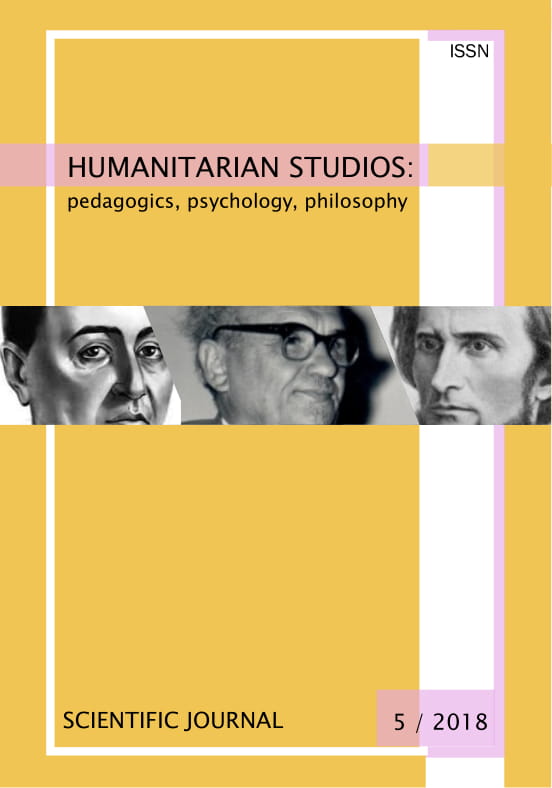CONCRETEING THE HUMANIZATION EDUCATION IDEAS AS THE BASES OF THE FORMATION OF THE GUMANISTIC DIVERSITY OF THE FUTURE FACTOR PERSONALITY
DOI:
https://doi.org/10.31548/hspedagog2019.02.004Abstract
The process of humanization of the education system contributes to solving the problem of forming the humanistic orientation of the personality of the future specialist and achieving the corresponding high professionalism. In this connection, there is a need to specify a number of ideas on the humanization of education as the basis for the formation of the humanistic orientation of the personality of a future specialist, as is done in the article. Different approaches to the understanding of the essence of humanization are revealed: humanitarian training and mastery of humanitarian knowledge, as the expansion of humanitarian knowledge, as a stimulation of aspirations of students for humanitarian knowledge. The humanistic orientation of the future specialist as the leading professional quality, which directs the actions of the manager to make administrative decisions on the person of the subordinate from humanistic positions, is determined. It is revealed that the structure of the humanistic orientation of the future specialist includes the following components: goodwill as a priori positive attitude towards the employee; empathic understanding taking into account the individual characteristics of employees, partners and colleagues; communicative skills as the ability to establish and maintain contacts and influence people; tolerance as tolerance to individuality, thoughts, way of life of employees, non-categorical judgments; professional optimism as a belief in human potential; knowledge of norms and rules of professional ethics, which provides justice as an objective assessment of labor and discipline, moral assessment and self-esteem of behavior, the formation of stereotypes of moral behavior.
References
Myshak O. O. (2016) Humanizatsiya profesiynoyi pidhotovky yak osnova formuvannya huma-nistychnoyi spryamovanosti may-butnikh fakhivtsiv-ahrarnykiv [Huma-nization of vocational training as a basis for the formation of humanistic orientation of future specialists-agrarians]. Visnyk Dnipropetrovsʹkoho universytetu imeni Alʹfreda Nobelya. Pedahohichni nauky. Seriya «Pedahohika i psykholohiya». Vypusk 1(11). 277-280.
Uchytelʹ Inna. (2015) Rozvytok humanistychnoyi sprya-movanosti maybutnʹoho pedahoha profesiynoho navchannya [Deve-lopment of the humanistic orientation of the future teacher of vocational education]. Naukovi zapysky. Seriya: «Problemy metodyky fizyko-matematychnoyi i tekhnolohichnoyi osvity». Vypusk 9 (III). 70-73.
Minyaylova A. V. (2010) Humanistychne vykhovannya studentiv u navchalʹno-vykhovnomu protsesi tekhnichnykh universytetiv [Humanistic education of students in the educational process of technical universities. Mykolayiv, 25.
Bekh I. D. (1997) Dukhovni tsinnosti v rozvytku osobystosti [Spiritual values in the development of personality]. Pedahohika i psykholohiya. Vypusk 1. 124-129.
Opolʹsʹka M. V. (2009) Formuvannya humanistychnoyi spryamovanosti maybutnikh mened-zheriv-ekonomistiv u protsesi profesiynoyi pidhotovky [Formation of the humanist orientation of future managers-economists in the process of professional training]. Kyyiv, 26.
Downloads
Published
Issue
Section
License
Relationship between right holders and users shall be governed by the terms of the license Creative Commons Attribution – non-commercial – Distribution On Same Conditions 4.0 international (CC BY-NC-SA 4.0):https://creativecommons.org/licenses/by-nc-sa/4.0/deed.uk
Authors who publish with this journal agree to the following terms:
- Authors retain copyright and grant the journal right of first publication with the work simultaneously licensed under a Creative Commons Attribution License that allows others to share the work with an acknowledgement of the work's authorship and initial publication in this journal.
- Authors are able to enter into separate, additional contractual arrangements for the non-exclusive distribution of the journal's published version of the work (e.g., post it to an institutional repository or publish it in a book), with an acknowledgement of its initial publication in this journal.
- Authors are permitted and encouraged to post their work online (e.g., in institutional repositories or on their website) prior to and during the submission process, as it can lead to productive exchanges, as well as earlier and greater citation of published work (See The Effect of Open Access).

